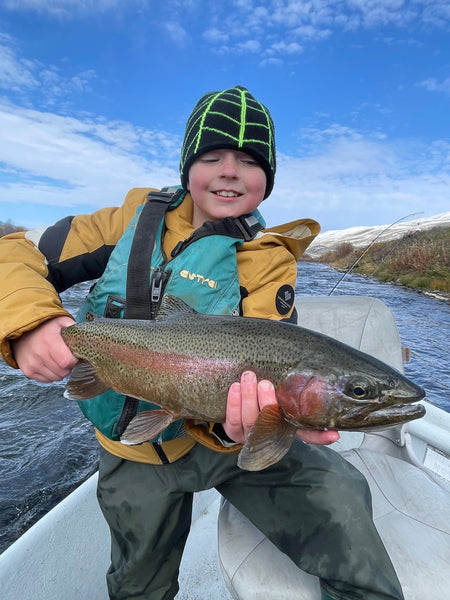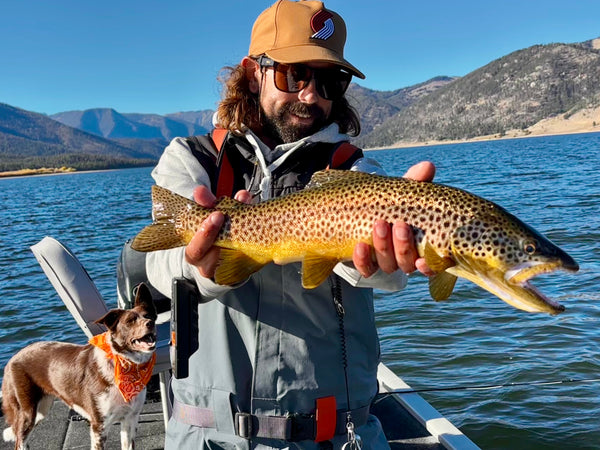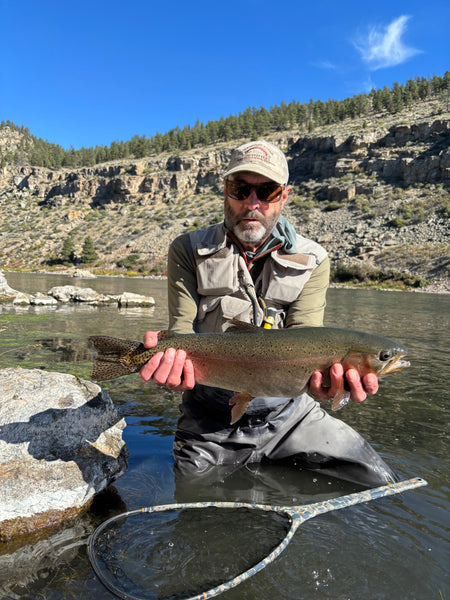Winter Fly Fishing Thoughts
Winter Thoughts

Why are some fish bigger than others? From a biological standpoint, the answer is simple; they consume more food (insects, fish, etc.) and expend less energy in doing so. This does not answer the root of the question though. Why are some fish bigger than others? This question has always intrigued me, and leads to philosophical thought on fish behavior that is speculative in nature. I will attempt to break down this question in the most methodical and thorough way I can, but will not come to a concrete conclusion and will ramble at certain points, but speculating is fun so let’s examine this question for a while.
This original question of why are some fish bigger than others is a direct pipeline to a second question, which is the real meat of the issue in my opinion; are some fish smarter than others? Most people I have discussed this with normally say yes at this point. Their answers are usually defended with comparisons of intelligence between fish and humans, which is fine, but doesn’t really answer the question. I couldn’t think of a better example of apples to oranges, which brings me to a major point. The only thing that separates humans from the rest of the animal kingdom is our capacity to rationally think. Not a single species of animals is capable of this, instead relying solely on instincts. Instincts that have been inherited from their predecessors and sharpened their entire life. So no fish can be smarter than another fish, but they may simply possess superior instincts. This allows us to make a fish to human comparison, because both of us possess instincts. I think it is reasonable to say that some humans have better instincts than others, so it is entirely feasible that some fish have better instincts than others. So how does something, in this case a fish, acquire superior instincts? This can be attributed to the natural selection process, or survival of the fittest if you will. It works quite simply, the fish with the best instincts (usually some of the larger specimens in the body of water) are able to reproduce more efficiently and pass on their superior genes to the next generation, who in turn inherit the “superior instincts.” The best of these offspring, or the ones with the best instincts (granted luck may play a role), proceed to reproduce and pass on their instincts to the next generation. More or less, each generation of fish have superior instincts than the previous generation.
To demonstrate this point, let’s look at an example. Let’s make the bold assumption that the trout in the Madison River do not like ospreys. Think about it for a second. How do the trout in the river even know what an osprey is? Maybe a handful have survived an osprey attack and saw the perpetrator, but the overwhelming majority have never seen an osprey, yet they know to be wary of them and their shadows. But how can you be wary of something that you are unaware of? This can be attributed to instincts. Fish that were less wary of sudden shadows and overhead movement were removed from the gene pool, a.k.a. became osprey food. When the survivors reproduced, they passed on these reservations regarding shadows to their offspring who did likewise. So back to the question; why are some fish smarter than others? In essence, I believe that their parents possessed superior instincts than their peers, or had a substantial amount of luck throughout their lives.
I guess you could say I heavily buy into evolutionary theory. However, I don’t feel as though this is a satisfactory answer. It doesn’t get to the root of the question, there has to be something more than just superior genes producing superior instincts. It does sometimes seem like fish possess something other than just instincts. Some fish just seem to know when things aren’t right. Say for example, an expert bait fisherman was to rig a minnow (natural forage species) with a very small hook and two-pound fluorocarbon line. One could call it the ultimate presentation, and there should be no reason that a trout would not fall for this setup. However great this presentation may be, some small part of me believes that some of the largest trout in a given system would still turn it down. They just know something is off, something is not right. I’m not sure what word to use to describe this trait, some sort of sixth sense perhaps, but I’m a firm believer in it. I’m also not sure I want to know what makes fish behave in this manner. It’s part of the magic of fishing, the unpredictable nature of it. If we could fully understand them, it wouldn’t be any fun. We’d go to the river and catch a fish on every cast and the novelty would wear off. That being said, the main reason I’m interested in examining these questions is to consistently catch more fish when I’m on the water. This talk of evolution can be directly applied to our fishing. Nowadays, the main predator to fish is us, the angler, and you can bet that the wheels of evolutionary change are slowly churning in our prey’s mind. The fish that don’t like the sound of crunching gravel, that don’t like orange thingamabobbers splashing down on the surface and that shy away from bold silhouettes will gradually become the superior fish in the system and will pass on their reservations to their offspring. Fish will gradually become wiser to our presence as we are now their number one predator. I think of it as a race to arms, and while I think that our three pound brain will be able to outpace their pea-sized one, I’m reminded time and time again on the water that this is often not the case.
Mike Forsburg
MRO Team Member
Leave a comment
Comments will be approved before showing up.
Also in Madison River Fishing Report - Upper Madison River Fishing Report - Greater Yellowstone Area Fishing Reports

Madison River Outfitters Fishing Report for 10/21/2025
This is the Last Report of the Year! Have a Great Winter, and We'll See You All This Spring!!



Brad Richey
Author